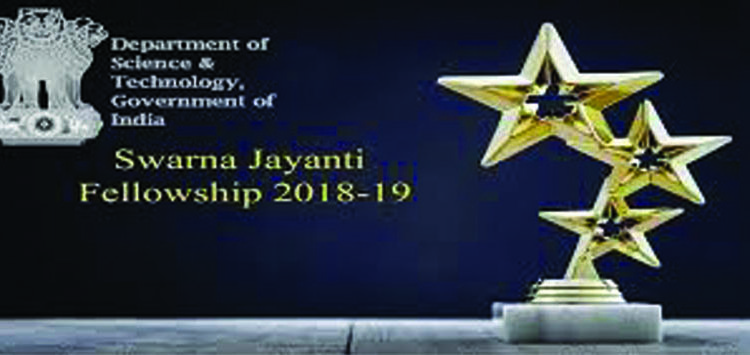NE EDUCATION BUREAU
NEW DELHI, JAN 4
Swarna Jayanti Fellowships have been awarded to 14 Scientists associated with projects containing innovative research idea and with a potential of making impact on Research and Development in their respective discipline. The scientists selected for the award through rigorous three-tier process. They will be allowed to pursue unfettered research with freedom and flexibility.
The Fellowships were instituted by Government of India to commemorate India’s fiftieth year of independence. Under this scheme, a selected number of young scientists, with proven track record, are provided special assistance and support to enable them to pursue basic research in frontier areas of science and technology.
The awardees are supported by Department of Science & Technology, for fellowship and research. This will cover all the requirements for performing the research and include a fellowship of Rs 25,000/- per month as well as a research grant of Rs. 5 lakh per annum for 5 years in addition to their salary. Out of the 443 applicants, 14 scientists have been finally selected this time for this scientist specific fellowship.
Brief accounts of the awardees are:
Dr. Sheetal Gandotra from CSIR- Institute of Genomics and Integrative Biology, Delhi is interested in studying host-pathogen interaction with a focus on the crosstalk between the host and mycobacterial metabolism, especially lipid metabolism.
Her major interests are Macrophage triglyceride metabolism induced by M. Tuberculosis which is crucial for the innate immune response in TB. Through her study she aims to provide a link between the infection induced pathology which leads to lipid droplet accumulation and the function of lipid droplet localized proteins in enabling the pathogenic immune response.
Dr. Jitender Giri from National Institute of Plant Genome Research is interested in understanding molecular regulation of low phosphate adaptations with focus on finding novel genes and understanding their functions in cellular signalling. His proposed work includes generating new rice varieties with improved use efficiency & low water requirements.
Dr. Rakesh Singh Laishram from Rajiv Gandhi Centre for Biotechnology, Thiruvananthapuram is interested in understanding the mechanism of gene regulation by RNA processing and how it affects various human diseases. He aims to define the regulatory pathway of RNA processing in oxidative stress response, cardiovascular disease and cancer.
Dr. Vishal Rai from Indian Institute of Science Education and Research, Bhopal is keen in the study of Organic Chemistry & Chemical Biology. He proposes to develop chemical platform that can render methods for single site modification of proteins in the field of drug discovery.
Dr. Kanishka Biswas from Jawaharlal Nehru Centre for Advanced Scientific Research, Bengaluru works on Renewable Energy & Clean Environmental solutions. He aims to design and synthesize new lead free inorganic solids, which will possess ultra-low thermal conductivity and high thermoelectric performance and are expected to be nearly maintenance free and environmental friendly. They can also be used in waste heat recovery and in electricity generation.
Dr. Gopalan Rajaraman from Indian Institute of Technology Bombay, Mumbai is interested in Computational inorganic chemistry, magnetism and materials science, surface chemistry, calculation of spectral parameters, modelling catalytic reactions in relevance to bioinorganic chemistry. He aims to address some outstanding issues
in the area of molecular spintronics devices using molecular magnetic materials.
Dr. Apoorva Khare from Indian Institute of Science, Bengaluru is interested in Positivity and analysis; representation theory of Lie algebras and discrete mathematics. Through his study he aims to study functions that preserve positivity in various forms when applied to continuous and discrete data, matrices and so on and to develop two way connections to symmetric function theory and algebra and
other subfields of mathematics.
Dr. Mahender Singh from Indian Institute of Science Education and Research Mohali is keen on studies in topology and algebra. Through his study he aims to investigate fundamental objects of study in low dimensional topology and understand finite group actions on manifolds.
Dr. Subimal Ghosh from Indian Institute of Technology Bombay, Mumbai is interested in Hydro-climatology with focus on regional modelling and understanding of Indian Monsoon and Atmosphere- Land Surface Interactions and Hydrology. Through his study he aims to develop physics guided systems approach, to understand the eco-hydro-meteorological system for a better understanding of the integrated system to define resilience.
Dr. Smarajit Karmakar from Tata Institute of Fundamental Research-Hyderabad is interested in Length and Time scales in Glass Forming Liquids, Understanding Fragility, Yielding of Amorphous Solids, Polymer Glasses, and Active Glassy Materials.
Through his research he aims to study plasticity in amorphous solids at bulk and nano-scale that will lead to better material design for practical purposes and also better understanding of the dynamics of the super-cooled liquid.
Dr. Arjun Bagchi from Indian Institute of Technology Kanpur studies Holographic Principle in terms of the gauge/gravity duality, non-relativistic conformal systems and various singular limits of string theory. He aims to understand Quantum Gravity through Holography and String Theory.
Dr. Anindya Das from Indian Institute of Science, Bengaluru focuses on
Geochemistry and Geophysics. Through his research he intends to identify the exotic topological states in graphene hybrids using new types of probes like heat flow, compressibility, and quantum noise measurements.
Dr. Yogesh Simmhan from Indian Institute of Science, Bengaluru is keen on Temporal Graphs: Abstractions, Platforms and Algorithms, Edge Computing and Storage, Scalable Data Management and Analytics for Science and Engineering. He aims to study temporal graph algorithms and analytics, models for representing and processing them.
Dr. Shweta Agrawal from Indian Institute of Technology, Madras, Chennai is interested in the field of Cryptography and Information theory. Through her research work she aims to study post quantum cryptography namely lattice based cryptography with the objective of improving the algorithms as well as understanding the gaps between
theory and practice.












